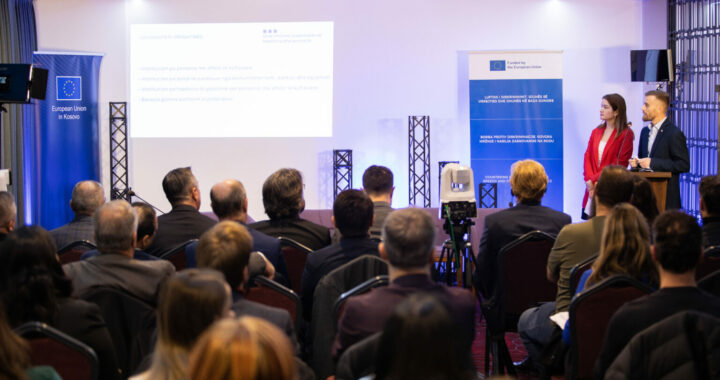

 Flaka Fazlija and Valon Fana presenting the findings of the report. Wednesday, November 29, 2023. Photo: BIRN
Flaka Fazlija and Valon Fana presenting the findings of the report. Wednesday, November 29, 2023. Photo: BIRN
A recently published report by Internews Kosova meticulously examines the stark disparity between legal obligations and their on-the-ground implementation of employment and the right to equal treatment in Kosovo.
A new report published by Internews Kosovo on Wednesday, found that laws in Kosovo are not being implemented in many areas when it comes to discrimination against marginalised groups.
The prevention of discrimination, employment, opportunities for professional advancement, unhindered access to healthcare spaces, and social assistance are some of the obligations that Kosovo has undertaken, but these legal obligations are not being implemented in practice, according to the report, titled “Systematic Discrimination in Public Spaces and Employment.”
The report has gathered data from five municipalities and the University of Prishtina.
The data were collected in municipal buildings, family medicine centers, and the largest public schools in the respective municipalities. Flaka Fazliu and Valon Fana, the authors of this report, indicate that many officials have shown a lack of awareness of some laws prohibiting discrimination.
“We have monitored and audited more than 20 institutions. There is non-compliance with the Constitution and laws. The Constitution does not tolerate any kind of discrimination, but the reality is discriminatory. The legal requirements for protection against discrimination, the employment of persons with disabilities, the law on pre-university education, and gender equality are not being fulfilled,” stated Fazliu.
She added that out of over 20 monitored institutions, fewer than 10 employees with disabilities were found, compared to over 3,000 employees in these institutions.
Fazliu said that there are also differences in municipal institutions, where there is no legal equality in decision-making positions. “In some schools, over 80 per cent of employees are women, while the director is a man; this is concerning and a violation of the law. We have also noticed the non-employment of minority communities. Members of these communities are not part of the school leadership,” Fazliu added.
According to this report, most schools have problems providing access to facilities [especially on the second floor] for students with disabilities. The University of Prishtina also faces challenges in providing access for persons with disabilities; according to the report, ramps and elevators are lacking.
Journalist Valon Fana says that field research has found that at the University of Prishtina, out of hundreds of employees, there is no person with disabilities employed.
“We have seen that in this institution, there is no one employed from the Roma, Ashkali, and Egyptian communities. In the Municipality of Prishtina, we have seen that schools in this municipality have problems with access for persons with disabilities; they lack elevators, toilets for persons with disabilities, acoustics, and signage. Family Medicine Centers provide access,” stated Fana.
On the other hand, the Social Welfare Center does not provide access for persons with disabilities.
“The Youth Palace is an old facility and has significant challenges with access. In institutions in Prishtina, low employment is observed among persons with disabilities. There is also inequality in the employment of women and persons from the Roma, Ashkali, and Egyptian communities,” Fana added.
In addition to the University of Prishtina and the capital, this report has also investigated the municipalities of Gjilan, Gracanica, Lipjan, and Vitia. The situation in these municipalities is also not good regarding access and the employment of marginalized groups.
29 November 2023 - 14:13

New digital platforms designed to combat the informal economy, like th...

New reports show that LGBTQI+ community in Kosovo was highly discrimin...

In Kosovo, where institutions promise equality on paper, the Roma, Ash...

A report from Internews Kosova highlights ongoing challenges in the fi...